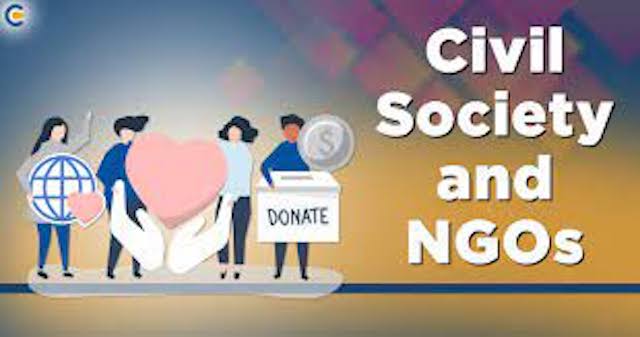The renewing of South Africa will not come from the very problem that caused its decay, which is government inefficiency, but will come from the marginalized and unsung people and sectors that form South Africa.
Civil society, the church, NGOs, NPO, CBO better positioned to deal with poverty

THANDISIZWE MGUDLWA I Tuesday, May 30, 2021
JOHANNESBURG – In South Africa and in black communities in America and elsewhere, Civil Society, the church, Non-Governmental Organizations (NGOs), Not-For-Profit Organizations (NPOs), Community Based Organization (CBOs), Co-Operatives etc, have always played a powerful role in the fight against poverty.
Poverty has been generally accepted as being a key factor in many societal ills and yet not always the root cause of all the evils facing South Africa, Africa and the world.
Greed, selfishness and corruption add fuel to the many human created hazards that the bottom 3 billion people experience throughout the world on a daily basis.
From ineffective government leaders and bureaucrats, the government system has not been able to end poverty in the history of humankind.
Presidential hopeful in the 2023 American Election, Sen. Tim Scott (R-SC) doesn’t attribute his climb out of poverty to his own virtue, to simply pulling himself up by his bootstraps or some abstract concept of the “American dream.” Scott stated explicitly that America has infrastructure that helped him climb and that infrastructure is under attack, as recently reported in The Washington Examiner.
Also revealed in The Washington Examiner article was that Social science finds this again and again: Probably the best research bolstering, civil society’s role in upward mobility came from the economist, Raj Chetty.
Chetty and colleagues found that one of the strongest correlates of upward mobility in an area is “social capital”, the amount of volunteering, the number of community institutions, the number of churches, etc, noted the paper.
Moreover, for working-class people, especially immigrants and African Americans, the central institution of civil society has always been the church, the paper noted. In Bowling Alone in 2000, Robert Putnam found that about half of all civic activity in America originated in religious institutions.
In South Africa, this is pretty much the same situation you are likely to find, as you see more churches embarking on Feeding Schemes even before the global Covid-19 pandemic lockdown commenced.
During and post colonial oppression and Apartheid, the church played an enormous role in the fight against poverty and also educated a lot of indigenous Africans across the continent.
Many of them, went on to be leaders in government, business, sport and other fields.
Post Covid and the devastating effects of rolling blackouts in South Africa, and elsewhere on the African continent, arises an opportunity to revisit the past to look and study what worked and did not worked.
This exercise could prove valuable in recharging the batteries in the ongoing struggle to end poverty. If you take South Africa for-instance, the broader liberation movement consisted of Civil Society, the Church, NGOs, NPO, CBO among others.
In 1992, with the dismantling of the United Democratic Front (UDF) with its 700+ organizations and its 1 Million Member campaign, saw the fracturing and distraction of a powerful Mass Democratic Movement (MDM).
Although the UDF and MDM efforts greatly led to the fall of Apartheid, the cracks of the MDM from the 1992 ending of the UDF would prove to be hurricane proportions as inequality, poverty and unemployment have remained stubbornly high and unacceptably on the increase.
So unrest has become the order of the day leading to the total break up of the social fabric of the nation. These painfully beats the whole purpose of gaining ‘liberation’. As the liberation of some is certainly no liberation at all.
Rights without economic freedom has led to other people declaring post Apartheid South Africa a ‘Failed State, not different to its many African counterparts. At the time the damage was not so clear as it would turn out to be in post Apartheid South Africa.
With South Africa being the most unequal country in the world, there’s a need to find fault with the sectors that have played such an important role in advancing an equal, democratic human rights based society.
The dominance of political parties in the so called new dispensation since 1994, has left many people, organizations and multiple sectors on the margins of society, where their views, aspiration and needs are an afterthought at best; or off no concern to the authorities at worst.
Suffice to say, that the biggest liberation movement in South Africa, the African National Congress (ANC), has mostly if not altogether grabbed and control international support for Civil Society, Church, NGOs, NPO, CBO etc, be it financial and/or non-financial support.
Even the question of the unsung heros and heroines of the liberation struggle and their families has robbed the Nation Building exercise of priceless intellectual and developmental capital, as the skills gained during the struggle days have either been underutilized or lost due to many factors like lack of resources and governmental support.
South Africa remains a broken country irrespective of a Thabo Bester or a Zaheera Boomgaard. From broken and dysfunctional families, the country has gone on overdrive in producing criminals, lost in a system that is broken in the first place.
The electricity crisis from Eskom and now the unclean water crisis directly linked to Cholera are very much a consequence of a broken society and system.
The renewing of South Africa will not come from the very problem that caused its decay, which is government inefficiency, but will come from the marginalized and unsung people and sectors that form South Africa.
Civil Society, the Church, NGOs, NPO, CBO and others sectors, the ball is in your court. The time for all these social partners to meet, plan and rebuild has arrived. It is these social partners that are meant to be implementing development agencies, not government.
NB: Mgudlwa is an award-winning journalist with more than 20 years of experience

